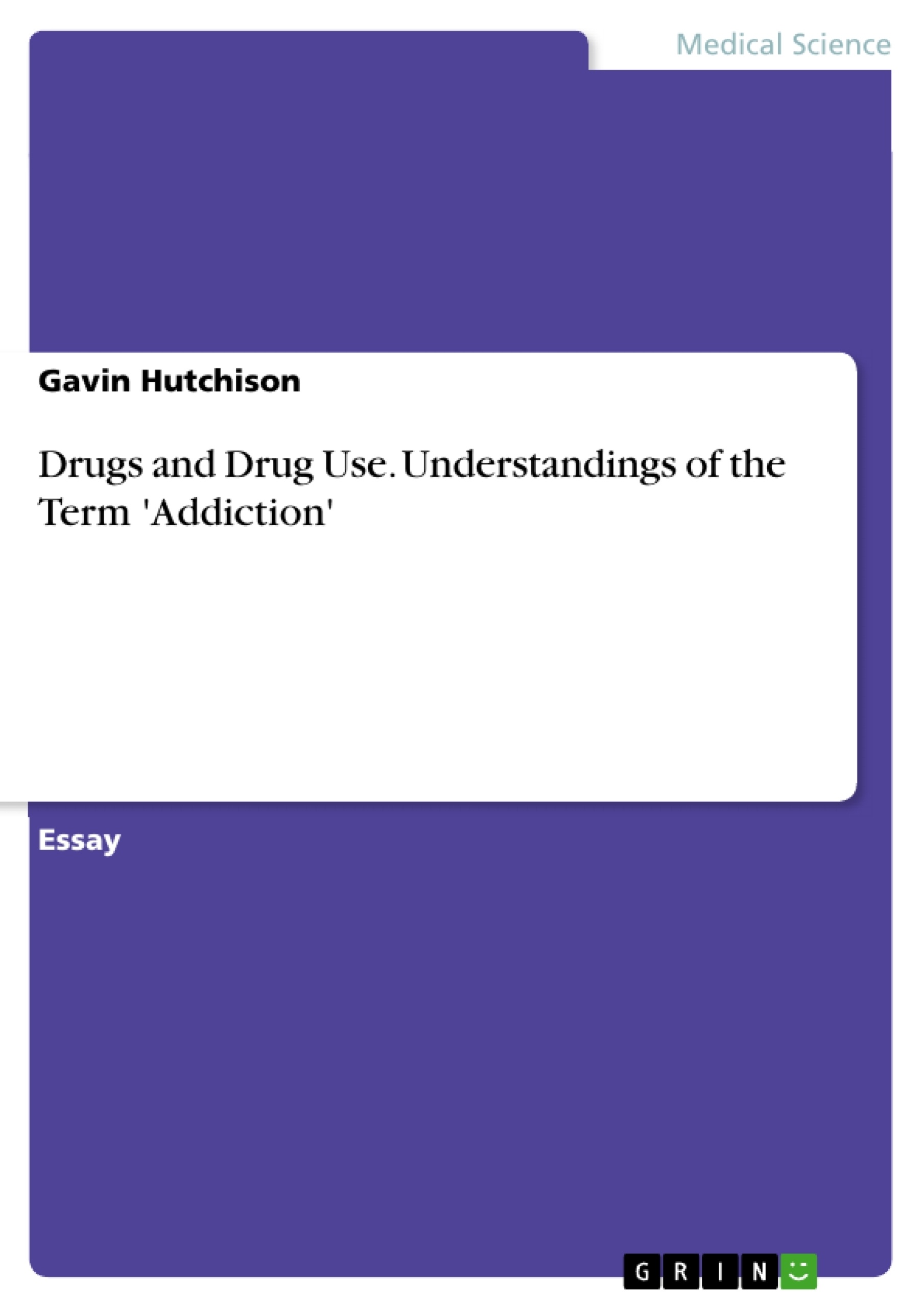In contemporary discourse ‘addiction’ can be applied to any number of behaviours or activities. For example “[i]n today’s society, we have sex-aholics, choc-aholics, work-aholics, shop-aholics, and golf-aholics. We have self-help programs called overeaters-anonymous, gamblersanonymous, internet-sex-anonymous, and smokers-anonymous”.
This recent discourse of addiction can be manipulated by ‘addicts’ to justify their behaviour, and to create sympathy towards them. Those claiming addiction may in fact not be an addict, however they now realise it is now more socially acceptable to be deemed an ‘addict’ than just participant in ‘addictive’ behaviors.
This essay will concern itself with discourses of addiction to drugs. Understandings of addiction to substances such as narcotics, tobacco and alcohol have been conceptualised and re conceptualised throughout recent history. Early biological and pharmacological theories of addiction still dictate policy on ‘addictive’ substances, however social and psychological theories have gained momentum and explain aspects of addiction biological theories do not.
Inhaltsverzeichnis (Table of Contents)
- Introduction
- Historical Understandings of Addiction
- Pre-19th Century Understandings
- The Rise of the Disease Model
- The Disease Model of Addiction
- Neurobiological Explanations
- Criticisms of the Disease Model
- Social and Environmental Factors
- The Vietnam War as a Case Study
- Social and Moral Restraints
- Availability and the Rational Choice Theory
- Conclusion
Zielsetzung und Themenschwerpunkte (Objectives and Key Themes)
This essay explores the evolution and complexities of understanding addiction, examining various historical and contemporary perspectives. It analyzes the strengths and weaknesses of different models, including the disease model, social and environmental factors, and the rational choice theory. The essay aims to provide a comprehensive overview of addiction, highlighting the diverse factors that contribute to its development and manifestation.- Historical Evolution of Addiction Concepts
- The Disease Model of Addiction: Neurobiological Basis and Criticisms
- Social and Environmental Influences on Addiction
- The Role of Free Will and Rational Choice in Addiction
- The Limitations of Universal Understanding of Addiction
Zusammenfassung der Kapitel (Chapter Summaries)
- Introduction: The essay begins by outlining the changing definition of "addiction" and its application to various behaviors. The focus is narrowed to the discourse of addiction to drugs, particularly narcotics, tobacco, and alcohol.
- Historical Understandings of Addiction: This section explores pre-19th century understandings of addiction, where it was primarily associated with legal or personal devotion, and not substances. The rise of the disease model, spearheaded by Dr. Rush, is examined, highlighting its shift from viewing addiction as a moral failing to a medical condition.
- The Disease Model of Addiction: This section focuses on the neurobiological underpinnings of the disease model, emphasizing the role of dopamine and the brain's reward system. It also presents criticisms of the disease model, including the fact that it does not explain why some people become addicted and others do not.
- Social and Environmental Factors: The essay explores social and environmental factors that contribute to addiction, using the Vietnam War as a case study. It discusses how the removal from familiar environments, exposure to trauma, and availability of drugs can increase vulnerability to addiction.
Schlüsselwörter (Keywords)
This essay focuses on the various theories and perspectives regarding addiction, particularly its historical evolution, neurobiological basis, social and environmental influences, and the role of free will and rational choice. Key concepts explored include the disease model, dopamine, reward system, social and moral restraints, availability, and the rational choice theory.Frequently Asked Questions
What is the disease model of addiction?
The disease model views addiction as a medical condition involving neurobiological changes in the brain's reward system, rather than a moral failing.
How did historical understandings of addiction change?
Before the 19th century, addiction was often linked to personal devotion. Dr. Rush's work later shifted the view toward addiction as a medical disease.
What role does dopamine play in addiction?
Dopamine is central to the brain's reward system; addictive substances often manipulate these pathways, reinforcing addictive behavior.
Why is the Vietnam War used as a case study?
It illustrates how environmental factors, trauma, and drug availability influence addiction, as many soldiers stopped drug use after returning home.
What is the rational choice theory regarding drugs?
It suggests that some individuals may make a conscious decision to use drugs based on perceived benefits, challenging the idea of total loss of control.
- Quote paper
- Gavin Hutchison (Author), 2015, Drugs and Drug Use. Understandings of the Term 'Addiction', Munich, GRIN Verlag, https://www.grin.com/document/288683



